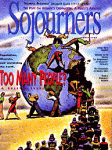Swamp Ophelia is a plant; it’s an actual plant," explains Indigo Girl Emily Saliers about the band’s newest release, Swamp Ophelia. "I was walking through a nature preserve and I saw this plant," Amy Ray adds. "When you think of Hamlet, Ophelia, and swamp, it all mixes together. We thought it sounded cool."
Swamp Ophelia is mellow, comforting, and soulful. Compared with past Indigo albums, it’s less angry, at times more abstract, and mixed with a myriad of instruments. But the strong suit on this record is, again, Amy and Emily’s raw, righteous blend of acoustic guitar and angelic harmony mixed with lyrics that pack a punch.
The album in general feels like a respite for listeners who take a daily dose of the world’s pain and need some breathing space. The lyrics and melody are served up with the cognition of grief in society, but with a personal message of reassurance and hope offered outright. Rather than stirring angry emotions about what’s wrong with the world and issuing a call to activism, this new album triggers a reflection on how life can be a beautiful blessing.
One cut on the album, "The Wood Song," has a radical and, in my interpretation, explicitly Christ-ian message of costly discipleship. It refers to Noah’s ark, its difficult journey, and at times the frailty of the vessel: "The wood is tired, and the wood is old and we’ll make it fine if the weather holds, but if the weather holds, then we’ll have missed the point, that’s where I need to go." The song announces a faith in God, "No way construction of this tricky plan was built by other than a greater hand" and the need to sift through life’s suffering to reach "the prize at the other side."
The album is also food for those contemplating the complexity and pain of "having loved and having lost." The vocals and acoustic guitar that stand alone in Emily’s "Fare Thee Well" are healing medicine for the pain of a broken relationship. "Mystery," a song Emily says is about "an inexplicable attraction between two seemingly opposite people," will also find popularity among those who have an ear for love songs.
That said,for those who took a special liking to the cathartic, angry ballads of albums past, Swamp Ophelia just might put you to sleep. After past recordings like "1-2-3" and "Pushing the Needle Too Far," one might expect to hear more of the same fast-paced material. Make no mistake, this album is not about driving angry youth to the mosh pit to slam dance. With the exception of the rousing, Holocaust-inspired "This Train Revised," each track is soothing, sweet to the ear, almost cuddly. It’s the kind of music that’s passable for playback at a family reunion with old folk in earshot.
The only major raucous, electric-guitar-and-drums moment on the album is rather awkward; it drops in out of nowhere at the end of "Touch Me Fall" as if another band entirely had crashed their studio for the final recording with a mini jam session of their own. It seemed like an eleventh-hour apology for the album’s mellow feel.
But what is it that really separates the Girls from the rest of the acoustic crowd? Amy and Emily go about their music in very different ways. In Swamp Ophelia, it is fairly easy to guess which songs are Emily’s and which are Amy’s. Aside from the obvious voice lead, Emily’s songs carry a less abstract, softer, even pastoral touch. Amy’s "This Train Revised," and "Dead Man’s Hill" are image-oriented, abstract, and on the reckless side. Perhaps it is this polarity of style and songwriting that actually creates the chemistry for their songs of beauty and artistry.
If this album is any indicator, Indigo tunes will continue to be the stuff to which we hum, whistle, and sing as much as Indigo verse continues to inform our hearts and minds.
Swamp Ophelia. By Indigo Girls. Epic, 1993.

Got something to say about what you're reading? We value your feedback!